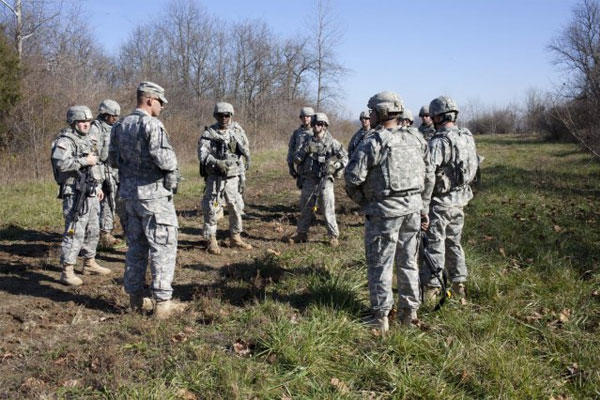The head of the U.S. Army Reserve said more soldiers may be deployed to Europe partly in response to Russia's military actions in the region.
The reserve component maintains a relatively small presence in Europe of about 1,200 soldiers, part of an Army footprint of some 28,500 soldiers and an overall U.S. military presence of about 65,000 troops, according to Pentagon data.
Lt. Gen. Jeffrey Talley, chief of the Army Reserve and commanding general of U.S. Army Reserve Command, said the number of reservists in the region may soon increase as a result of Russia's continued support for rebels in Ukraine and its annexation last year of the Crimea region from the former Soviet republic.
"I'm looking at increasing possibly some force structure in Europe to help meet all the many mission requirements that EUCOM and U.S. Army Europe are saying is important," he said during a breakfast with reporters on Thursday in Washington, D.C., referring to U.S. European Command. "Some of those I'm sure are to directly send a message to President Putin and others that the U.S. is still actively engaged in Europe and want to make sure that we provide a positive presence in Europe."
Talley was responding to a question from a reporter who asked him whether he was concerned about recent statements from the U.S. military's top brass, including Marine Corps Gen. Joseph Dunford -- the next chairman of the Joint Chiefs of Staff -- who characterized Russia as the greatest national-security threat to the U.S.
In testimony last month during his confirmation hearing to succeed Army Gen. Martin Dempsey as the next top military advisor to President Obama, Dunford said, "If you want to talk about a nation that could pose an existential threat to the United States, I'd have to point to Russia." Dunford added, "If you look at their behavior, it's nothing short of alarming." He also said he favored supplying weapons, including Javelin anti-tank missiles, to Ukraine in order to counter Russia's "hybrid warfare."
Talley didn't say how many more reservists might deploy to the continent or when.
The Army is in the process of downsizing after more than a decade of war in Afghanistan and Iraq and amid automatic spending caps known as sequestration. The service recently announced plans to shed 40,000 soldiers from bases around the world, including a brigade's worth of troops at Joint Base Elmendorf-Richardson in Alaska.
Despite its shrinking presence in Europe, the U.S. military over the past year has sent more personnel and equipment to the continent in support of Operation Atlantic Resolve designed to show American support to NATO allies in the wake of Russian aggression in the region.
For example, the Air Force in 2013 brought the Cold War-era A-10 attack aircraft stateside as part of a consolidation of bases and equipment in Europe. But in February, it sent a dozen of them back to the continent in February as part of a theater security package. A month later, the service deployed 12 F-15E fighter jets to the region.
The Army, meanwhile, has also positioned multiple so-called European activity sets, each of which includes hundreds of Abrams tanks, Bradley fighting vehicles and Paladin self-propelled howitzers in countries near the Russian border. The service in March also ordered a convoy of Stryker combat vehicles on a 1,100-mile convoy through six European countries.
Talley said the moves aren't designed to antagonize Russian leadership.
"I'm not aware, as a senior Army leader, that there is a concerted effort to aggressively pursue provocative actions against President Putin in Russia," he said. "I'm not aware of it."
Despite the Russian president's strong approval ratings -- they reached a record high 89 percent in June, according to an independent polling center in Moscow -- "he's doing things that have people concerned inside of his country and outside of his country," Talley said.
"The United States wants to send a positive message that we are engaged in Europe and we're there to support NATO and then collectively as a broad group of governments want to do everything we can to have a peaceful and stable Europe," he added. "So the Army Reserve is helping do that. But I'm not aware of any specific plan to do something more aggressive than that at this time. We take our lead from the commander in chief."
-- Brendan McGarry can be reached at brendan.mcgarry@military.com




























